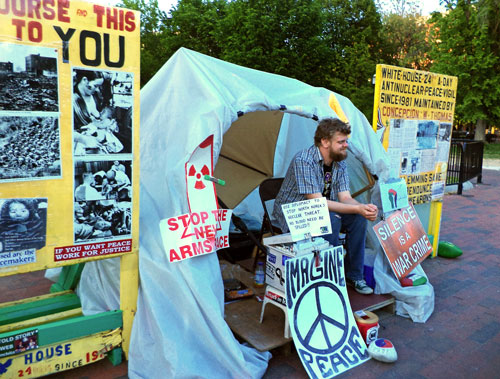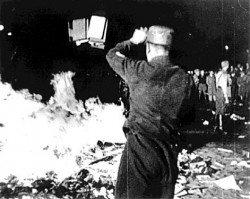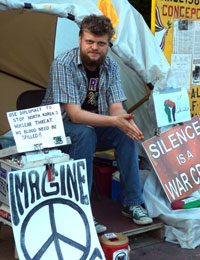Lessons from History
by Vijay Nair / May 13, 2013 / No comments
A visit to Washington DC prompts thoughts on peaceful protest, book burning, and Hitler in India.

Manning the White House Peace Vigil, thought to be the longest running peace vigil in US history. Photo: Vijay Nair.
Last week, my family and I had an illuminating visit to Washington, DC. One evening our hosts insisted on taking us to the White House on a post-dinner drive. However, visitors are no longer permitted inside the building, so all we could do was gawk at it from beyond the gate. I had seen the US President’s residence before, but this was the first time that I saw it at night. I like the White House because it’s unimposing. Nothing very fancy about it at all. Standing in Lafayette Square, my attention was drawn to a small booth with protest posters on it. There was a young lady pacing outside the booth. It was she who told me about the longest running peace vigil in the United States of America.
Earlier in the day we had gone to the Holocaust Memorial Museum. Apart from being moved, I was also startled to find statements that were critical of America’s role in the early years of the war when Jews in Europe were being persecuted in a most inhuman way. It made me feel freedom of expression was alive and thriving. Then I got goose bumps when we came across the exhibit that depicted the burning of books by Nazi students in 1933, an evil portent of the havoc later caused by the regime.
I wanted to export the museum to India as a lesson to all those who get carried away by right-wing fundamentalist forces. Burning books may seem an innocuous thing to do, but the act contains all the violence inherent in committing the outrage against another human being. In India, this despicable act was carried out in 2010 by Aditya Thackeray, the young scion of Shiv Sena, the right-wing Hindu Fundamentalist party from Bombay. He, along with his young followers, publicly burnt copies of Rohington Mistry’s novel Such a Long Journey, which contained unflattering references to Aditya’s despotic grandfather. Following the protest, the Vice Chancellor of Bombay University quietly capitulated and withdrew the book from the syllabus. This entire sorry episode should count as one of the most shameful blots in the history of independent India, especially because one of the associations with the country’s ancient culture has to do with knowledge and wisdom.

A member of the SA throws confiscated books into the bonfire during the public burning of 'un-German' books on the Opernplatz in Berlin on May 10, 1933. Photo: National Archives.
It is in this context that I find George Santayana’s statement, “Those who cannot remember the past are condemned to repeat it,” particularly relevant. Aside from the book burning, a surprising aspect of the country associated with Mahatama Gandhi’s non-violent movement is that it also registers an alarmingly high rate of sales for Adolf Hitler’s autobiography Mein Kampf. Additionally, politicians like the late Bal Thackeray have often owned up to their admiration of Hitler in their lifetime.
Hitler’s politics and propaganda were all about grievances, and despite the world condoning the barbaric acts of his regime for a few years, he was not only defeated comprehensively but ended up killing himself, leaving his countrymen with an enduring baggage of shame and guilt. That is why I find it surprising that he continues to have admirers in the most unlikely of places who make half-baked associations of national pride with him and treat him as a symbol of national liberation. Emulating his philosophy can only end in shame and ignominy and why would any sane human being want to do that?
Although we went to other places in Washington, DC, the enduring images I carry from the trip are of these two institutions: One which symbolizes the power of protest against the world’s (currently) most powerful symbol, and the other, which imparted poignant and life-affirming lessons from history. For a developing country and a comparatively new democracy like India, both the peace vigil across from the White House and the Holocaust Memorial Museum have relevance, not just to educate, but also to mobilize the country’s youth in the right direction.
I was glad my teenage son was able to imbibe two very powerful messages from this visit we undertook as a family. The first had to do with the strength of conviction in the face of adversity. And the other has taught him how hate can only bring distress and despair in its wake.





